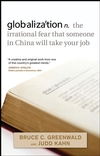 Fables beat tables, Greenwald and Kahn believe, and they are not very happy about it.
Fables beat tables, Greenwald and Kahn believe, and they are not very happy about it.
Fables, metaphors and anecdotes (think Thomas Friedman) have proven more persuasive than facts and figures in shaping public attitudes and policies regarding globalization. The stated aim in this book is to push back, fighting stories with solid data. No one who reads this blog will be surprised that I am sympathetic to this general line of reasoning: my 2005 book Globaloney made much the same argument.
globalization is very much a critique of the anti-globalization literature in the style of recent volumes by Jagdish Bhagwati (In Defense of Globalization) and Martin Wolf (Why Globalization Works). globalization arrives a bit late to the party, to be honest, after most of the big issues have been pretty thoroughly chewed over (a fault it shares with Bad Samaratans reviewed below). A lot of the points that the authors reveal dramatically are no longer fresh. Globalization is not a new thing? Yes, I've read that before. The Local is generally more important than the Global? Uh huh.
Books like this sometimes feel as though they were written in response to Joseph Stiglitz's Globalization and its Discontents, which first appeared back in 2002 (Greenwalk has actually taught a class on globalization with Stiglitz at Columbia). Maybe it is just me -- I've read a lot of globalization books -- but it takes something really new and original to grab my attention.
globalization’s strength lies in its clear application of basic economic principles to reveal the hidden logic (and illogic) of claims about globalization’s causes and effects. It is the analysis that actually impressed me more than the data.
This book actually appears at an opportune moment. The current economic crisis is likely to cause globalization to recede -- businesses and governments will pull back from global strategies and embrace local and regional arrangements. This book, if read in the right way, shows why this makes sense now -- and in fact has made sense all along. The chapters on financial markets and institutions, while not written with today's financial crisis in mind, are still useful in making sense of the changed environment.
The book would be a more useful tool for students if it included a bibliography (why do serious books leave this out?) and if more detailed notes were provided. And it would make a greater contribution to the literature if it gave a better answer to the question, why do fables beat facts?